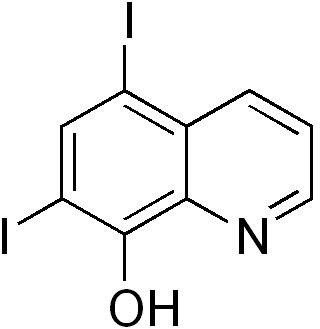| name | Iodoquinol |
| classification | Antiprotozoal, Antiamebic |
| pharmacokinetics | Iodoquinol is poorly absorbed from the gastrointestinal tract. It primarily acts locally in the colon and small intestine. The primary mechanism is thought to be disruption of microbial cell membrane functions. Excretion is primarily through the feces. |
| suggested dosage | | adult | Typically 650 mg three times a day for 10 to 20 days, depending on the specific indication and severity of infection. Consult with a healthcare professional. | | patient specific note | Dosage recommendations may vary based on the specific infection, patient factors, and tolerance. A healthcare professional should determine the appropriate dosage for an individual patient. The provided dosage is a general guideline. Do not self-treat. |
|
| indications | | 1 | Amebiasis (intestinal and extraintestinal) | | 2 | Giardiasis | | 3 | Balantidiasis | | 4 | Other parasitic infections (use restricted and requires specific clinical judgement). | | 5 | Note: Its use for these indications is often limited by the availability of safer and more effective drugs. |
|
| safety in pregnancy | Limited data are available. Potential risks to the developing fetus are uncertain. Use only when the potential benefit outweighs the potential risk, and under the strict supervision of a healthcare professional. Consult a physician during pregnancy. |
| safety in breastfeeding | Iodoquinol is excreted in breast milk. Its safety for breastfeeding mothers is not fully established. Use only when potential benefits outweigh potential risks and under the direction of a healthcare professional. Do not breastfeed during treatment unless specifically approved by a physician. |
| side effects | | 1 | Gastrointestinal upset (e.g., nausea, vomiting, diarrhea) | | 2 | Headache | | 3 | Skin reactions (e.g., rash, itching) | | 4 | Neurological effects (e.g., peripheral neuropathy, dizziness) | | 5 | Changes in taste | | 6 | Rare cases of serious liver damage |
|
| alternatives | |
| contraindications | | 1 | Known hypersensitivity to iodoquinol or related compounds | | 2 | Severe liver disease | | 3 | Pregnancy (unless clearly necessary and under supervision) | | 4 | Breastfeeding (unless explicitly advised by a healthcare provider). |
|
| interactions | | 1 | May interact with other medications. Consult with a healthcare professional regarding any other medications you are taking. | | 2 | Avoid use with other drugs that can cause severe neurological problems. | | 3 | May potentiate the effects of other medications if combined. |
|
| warnings and precautions | | 1 | Use with caution in patients with kidney disease | | 2 | Close monitoring of liver function tests is recommended during treatment. | | 3 | Long-term use should be avoided due to potential side effects and possible drug accumulation | | 4 | Avoid prolonged use or excessive dosage unless under direct medical supervision |
|
| additional informations | | 1 | Iodoquinol should only be used for specific parasitic infections under the direct supervision and recommendation of a physician or other qualified healthcare professional. | | 2 | Self-treatment with iodoquinol is strongly discouraged. | | 3 | Due to potential side effects, alternative treatments, if available, should be considered. | | 4 | Consult a doctor for appropriate diagnosis and treatment. |
|
| patient age weight specific notes | For a 25-year-old male weighing 70kg, the standard dosage and precautions apply. However, individual factors and concomitant medical conditions should be considered by a healthcare provider. |

